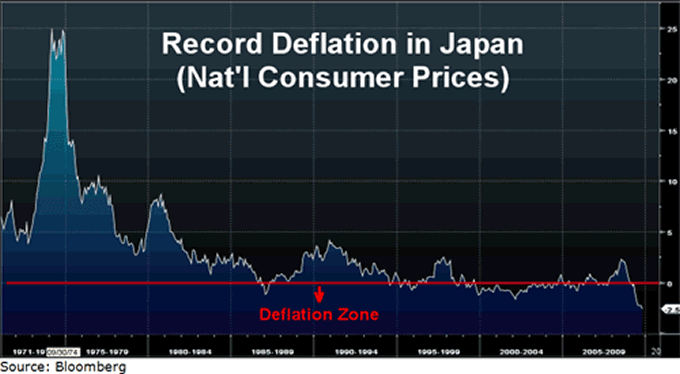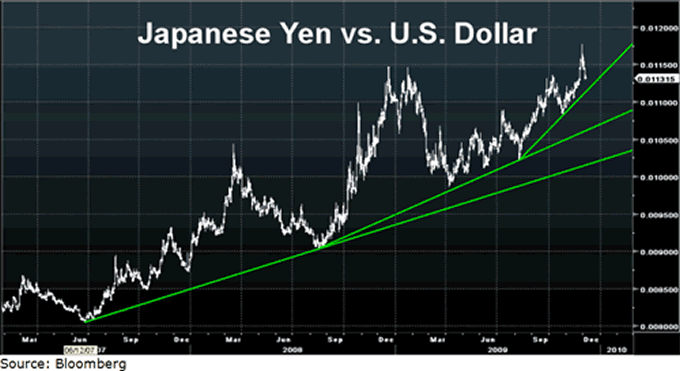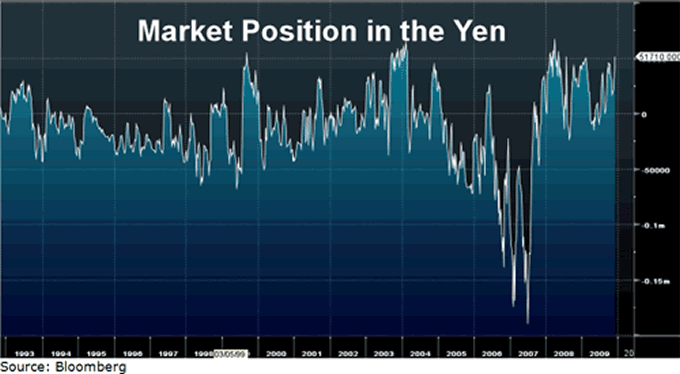Has the Japanese Yen Topped?
Currencies / Japanese Yen Dec 05, 2009 - 08:00 AM GMTBy: Bryan_Rich
 The Japanese yen has been the best performing currency over the past two-and-a-half years. Since the unraveling of the subprime mortgage market and the subsequent peak in the carry trade, the yen has soared 38 percent against the U.S. dollar, 21 percent against the euro, 41 percent against the British pound and 23 percent against the well-loved high-yielder, the Australian dollar.
The Japanese yen has been the best performing currency over the past two-and-a-half years. Since the unraveling of the subprime mortgage market and the subsequent peak in the carry trade, the yen has soared 38 percent against the U.S. dollar, 21 percent against the euro, 41 percent against the British pound and 23 percent against the well-loved high-yielder, the Australian dollar.
And despite the punishment the Japanese economy has taken and despite the return of zero interest rate levels, the yen just keeps rising!
Then last week the yen ripped through 2008’s extreme levels, marking new 14-year highs.
So today, let’s take a closer look at Japan and the yen …
Observation #1: Fundamentals Are Not Creating Demand for the Yen
It’s certainly not the Japanese economy that’s creating demand for yen. The impact of the global recession on Japan relative to other major economies has been far worse. In 2009 the Japanese economy is expected to contract 5.3 percent, the deepest of any major economy. And for 2010, Japan is expected to return to growth but to underperform the U.S.
Meanwhile, deflation is back in Japan and running at record levels. Japan has fought deflation for the better part of the last decade and now, as shown in the chart below, prices are falling faster than ever before.

I expect Japan will keep interest rates low for a long time and keep pumping money out to battle deflation. And let’s not forget while the entire world is increasing debt loads toward the 100 percent of GDP area, Japan’s debt is approaching 200 percent of GDP! That’s the second highest in the world only to Zimbabwe.
On a fundamental basis then, the yen should be weaker, not stronger than its other major trading currencies.
What’s more, the divergence between yen strength and the fundamental backdrop of the Japanese economy is why the yen is considered nearly 25 percent overvalued against the dollar on a purchasing power parity basis.
Observation #2: Technicals Point to a Weakening Yen
The yen is in an uptrend against the dollar dating back to the middle of 2007, with accelerating strength. The carry trade in the yen was enormous. But the bubble popped … and the unwinding of the carry trade required investors to sell their higher yielding currencies and repurchase yen in order to cover their exposure from the crumbling emerging market economies.
The squeeze on these trades was violent and the global deleveraging is still ongoing. And that’s why we’ve seen continued strength and momentum in the yen.
Then we have the Dubai debt restructuring, which came over the illiquid holiday last week. And the yen took off, breaking through last year’s highs, marking new 14-year highs versus the dollar.
But, as you can see in the chart below, the sharp V-shaped reversal over the last few days suggests this run for the yen might be over.

Observation #3: There’s the Possibility of a Massive Run for the Exits
The long yen trade is crowded … very crowded. In fact the yen has one of the largest speculative long positions in the history of tracking by the Commitment of Traders Report published by the CFTC. That’s a sharp contrast to the record short position that the market was holding with the carry trade at peak popularity.
Take a look at this chart …

When the yen reverses, these speculative traders will all be running for the exit door.
Meanwhile, Intervention Threats Are Rising …
Japan’s new finance minister, Hirohisa Fujii has had a challenging time with his new position as “Mr. Yen.” The media stands outside of his door daily prodding him for comments on the yen. And he hasn’t disappointed them. But he has disappointed some of his constituents, especially … exporters.
First he said he wasn’t concerned about yen strength. He even said a stronger yen could be good for the Japanese economy. But he’s since done an about face, taking a tougher stance against the strengthening yen.
Japan has a reputation for being sensitive to movements in the currency markets and for taking action. Its heaviest periods of intervention tended to coincide with slower economic growth rates — like it’s experiencing now.
The last time Japan intervened to weaken the yen was between 2003 and 2004 …
Over the course of 126 days the Ministry of Finance sold yen in the open market to purchase 315 billion U.S. dollars. These steps ultimately sent the yen 11 percent lower.
But the overall success of interventions in changing the long-term path of a currency is not great. A lot depends on how it’s done …
 |
| The yen is considered nearly 25 percent overvalued against the dollar. |
Changing the path of a currency tends to have a higher success rate when countries act together in support of (or against) the same currency. These coordinated interventions also have a greater spillover effect on other currencies.
After the yen spiked to new 14-year highs following the Dubai news, Fujii stepped up his position calling the yen movements “one-sided” and saying that, when necessary, he would engage the U.S. and the Eurozone about currency issues. Moreover, the Bank of Japan was said to be checking rates with banks last week. That tactic is used by the central bank to send a message to the markets.
In sum, the intervention scare and the disequilibrium between the yen and the Japanese economic situation seems to have gotten the market’s attention … so far. The yen has fallen 6 percent off of its lows last week, in just six days. A deeper decline could be in the cards.
Regards,
Bryan
This investment news is brought to you by Money and Markets . Money and Markets is a free daily investment newsletter from Martin D. Weiss and Weiss Research analysts offering the latest investing news and financial insights for the stock market, including tips and advice on investing in gold, energy and oil. Dr. Weiss is a leader in the fields of investing, interest rates, financial safety and economic forecasting. To view archives or subscribe, visit http://www.moneyandmarkets.com .
© 2005-2022 http://www.MarketOracle.co.uk - The Market Oracle is a FREE Daily Financial Markets Analysis & Forecasting online publication.



